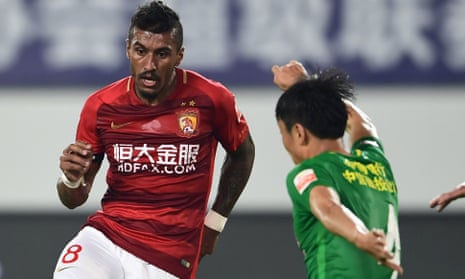April 2017: Paulinho had messed up. There was the Brazilian in China advertising a betting site alongside a Japanese porn star. His club, Guangzhou Evergrande, were unhappy about being kept in the dark about such controversial activities and there was even wild talk of deportation. It was one of the few mistakes he would make in Asia.
Not even the most committed gambler in south China or north London would have bet back in June 2015, when the midfielder signed for Guangzhou from Tottenham, that he would be heading back west two years and two months later to join Barcelona. After all, the midfielder had been declared a flop in England after two underwhelming seasons with Spurs from 2013-15. So bad had it become, with three starts in his second campaign, that his next destination was China to join his former Brazil manager Luiz Felipe Scolari. We all know the reputation that the Chinese Super League has in Europe. The big names have arrived but the respect has not. Those who go there do so for the money.
Yet it is Barcelona who have splashed out, paying £36.4m (€40m) to activate his release clause, a fee roughly three times more than Guangzhou paid Spurs and more than twice the record amount a Chinese team have received for a transfer. European eyebrows are as raised as the fee. Just before the signing was confirmed, the BBC called the move “one of the more random transfers of recent times” and asked whether he would even be a good signing for West Ham or Everton.
One wonders how many have seen the former Corinthians midfielder play since he left England because Paulinho has been excellent in the Chinese Super League. He has been better than Alex Teixeira, better than Ramires, better than Ezequiel Lavezzi and better than Oscar (though an eight-match ban for the former Chelsea player for kicking the ball at two opponents during play, sparking a huge brawl, makes that comparison a little unfair).
“Sometimes in training we will just watch him,” said a former midfield partner Zheng Zhi, formerly of Celtic and Charlton Athletic. “He is a second ahead of everyone else.” Perhaps that is why he has time to advise and help the younger players at Guangzhou. Zheng added last week that Paulinho will be sorely missed but wished him well in his new adventure, sentiments that most fans in China share. The pain of parting may be mutual. On plenty of occasions Paulinho spoke of his satisfaction with life in China, on and off the pitch, and working with the protective arm of Scolari around his shoulders, a man who also knows something about leaving London with a reduced reputation.
Under Scolari, the 29-year-old became the perfect overseas signing, bringing power and authority to Guangzhou and the ability to dictate tempo and drive forward. In all he played 95 games – impressive in just over two years – and scored 25 goals, some of which were truly spectacular. If winning two Chinese Super League titles and one Asian Champions League is not enough to convince the doubters, then there is the more subjective point that Paulinho has been the best player in Asia for the past 18 months. Succeeding there is not a given. Guangzhou spent much more buying Jackson Martínez from Atlético Madrid but the Colombia striker has struggled. It remains to be seen if, and probably when, he returns to Europe, he will be known as a CSL flop.
Paulinho may or may not be the world-class talent that Barcelona fans were expecting to arrive with the first flash of the Neymar cash. Yet since leaving Europe he has not only shone in Asia, he has also returned to the Brazil national team. He had last played for them at the 2014 World Cup and it was assumed that playing in China spells the end of international careers.
It helped that Brazil’s manager, Tite, knew the player from Corinthians, but this was no sentimental selection. In World Cup qualification Brazil, who started along the road to Russia with a little wobble, won all eight games after the midfielder returned. A personal high-point came with a hat-trick in a 4-1 win in Uruguay in March. Perhaps Barcelona – and Bayern, who were interested back in April – do not see him as a Spurs failure but a vital member of a Brazil team who were first to qualify for the 2018 finals.
If Paulinho can rebuild his career with Brazil then he can reforge his reputation back in Europe. Chinese and Asian football is not held in high enough regard to remove the flop label – that will only change if more players leave for Europe’s bigger clubs – but Barcelona are.
The step up from Canton to Catalonia is obviously big but it could just be that Tottenham fans, for whatever reason, did not see the best of a very good player. Succeeding with Guangzhou may not automatically mean he is a world-beater but then struggling with Spurs does not mean the opposite. Paulinho has earned his chance.

Comments (…)
Sign in or create your Guardian account to join the discussion